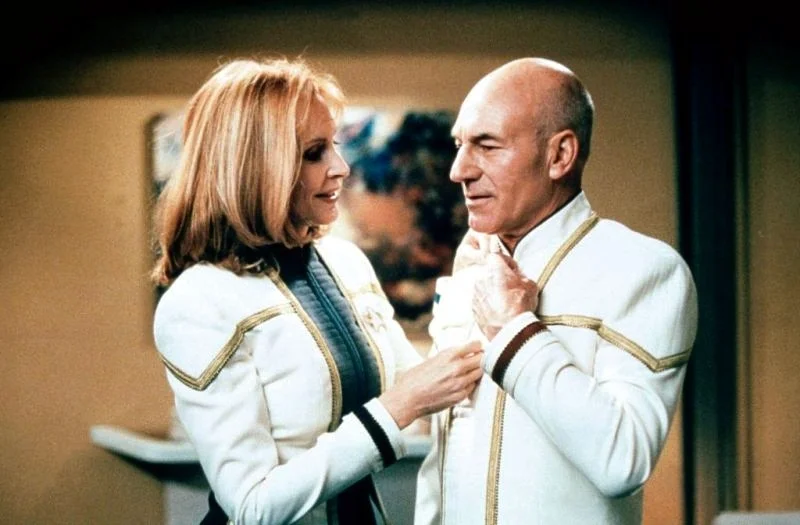by Matthew Rushing
David Mack’s Cold Equations trilogy continues in Silent Weapons, and just like the first book, it does not disappoint. Each book in this series is a stand-alone adventure, yet threads and themes run through each one. This works well and leaves the reader satisfied, yet still longing for the full completion of the series.
Families in Space
In The Next Generation, much was made of the Enterprise-D having families aboard; people no longer had to leave them behind, but could bring them along as Starfleet explored the galaxy. It was a wonderful premise, but it was never truly realized on screen. Most of the main cast did not have children. Wesley and Beverly Crusher were not a good representation of family life in Starfleet, nor was the introduction of Alexander into Worf’s life. Neither of these situations was sufficiently explored or looked at; fans had to wait for DS9 to really get their first look at the inner workings of the 24th century family.
Silent Weapons is the answer to this issue. Picard and Crusher have a family now, and instead of ignoring that, Mack has explored what it means head-on. He explores the issues of what it is like to have a family on a starship and the effect on Picard’s son of being the child of one of the most famous men in the galaxy. Crusher asks these questions intently after seeing her son in the ship’s daycare. When he leads, the other children follow, and she worries that it is only because he is “the captain’s son.” The idea of social hierarchy on a starship, the officers, noncoms and enlisted persons all gravitating towards their own rank — a kind of segregation that naturally happens with humans, even in the 24th century — is picked up and emulated by the children. Crusher worries about how this will impact her son. Will he become prejudiced against those of lower ranks or look down on others just because he is the “captain’s son?” Will he face undue pressure to perform, or be just like his parents? It seems that even in the Federation, and especially in Starfleet, many of the issues dealt with today are still struggles in the future.
Picard and Crusher have issues of their own to deal with; specifically, the ways in which marriage and family have changed Picard. Crusher comes face to face with the “new” Picard when he chooses to shield her in a firefight instead of guarding the Federation president or the Gorn Imperator. Why did he not protect them and choose her instead? Where is the hero she married? It is at this moment that she realizes Picard is no longer the hero, but a husband and father. He explains his rationale for protecting her instead of the heads of state in a heated discussion with Beverly in their quarters,
“But if I lost you, there would be no one replacing you in my life — or in René’s. The same would be true if I’d been killed. Or worse yet, both of us… Beverly, I waited a long time to start a family, perhaps too long. But now I have one, nothing in the universe matters more to me. Not my president, not my oath of service, nothing. If that diminishes me in your eye…so be it.”
The raw honesty of Picard’s words cut Beverly to the heart, and the tension does not end until they talk at the end of the book.
Marriage and family change people and priorities. This change can be hard to deal with if both partners are not willing to listen and work towards understanding. For the Picards, the answer is loving family first, exploring the galaxy and being on the Enterprise, in that order. If the last one interferes with the first, Picard makes it clear he will gladly give it up. This is a far cry from the man yelling at Wesley to get off his bridge, or being annoyed at the very thought of children on a starship in the first place. It’s a welcome change.
Death and Growth
A theme that is repeated in this book from the last is, “What is Data?” Data says, “Because my prior self was destroyed, his original continuity of consciousness ceased to exist. Mine is therefore unique and separate, and by virtue of sequentially, second. As distinctions go, this one seems far from trivial.” So, Data is different and yet so much the same. For him, there is merely a gap in his life that is filled in by the memories of his father. He hasn’t experienced any of the loss his death created, nor as he puts it, has had no time to “miss” anyone.
Geordi has had nothing but time to miss his friend. He has spent the last four years coming to grips with the loss of his best friend, and now that friend has been thrust back into his life in a most unusual way. In many sci-fi shows and comic books, a character comes back to life and the people around them are left struggling to cope with this reversal of nature. Geordi’s frustration with this conundrum gives the character some much-needed growth. We finally see the inner workings of the now-second officer of the Federation flagship, and Mack gives him some shining, long-overdue moments in this book.
You Reap What You Sow
One of the most interesting things that plays out is the Breen’s machiavellian machinations. They are willing to use their allies as fodder so they can elevate themselves into a greater position in the Typhon Pact, as well as the Alpha Quadrant. This devious plan backfires, creating a new sense of mistrust for the maligned Gorn, giving the already weary archosaurs further reason to begin working towards seceding from their current alliance. The power play that the Breen make spreads the seeds of disharmony, and the result of their plans leave them in a worse position than before. The law of the harvest is in full effect, leading to the question, “How might these issues be seen today and what can be learned from the mistakes of the Breen?” Treating allies as stepping stones and adapting a foreign policy of selfish exploitation will ultimately lead to ruin. When a society’s back is against the wall, it reveals its true principles. Mack shows this in the fashion that all of the best Star Trek episodes have, giving the reader plenty to ponder.
Conclusion and Rating
Silent Weapons has the impressive action that readers expect from a David Mack book. He mirrors this perfectly with character moments that continuously push the Next Generation crew into new and interesting places, all while providing the shake-ups he is know for. I cannot recommend this book more highly; I give it nine androids out of ten.




